Opinion | South China Sea code of conduct between Asean and China in peril
Greg Torode fears that the maritime pact between China and Asean - which has been years in the making - is now in peril

If China needed any further excuses to place on the back burner negotiations with Asean over worsening tensions in the South China Sea, the Philippines' actions in the past week may have provided them with one.
Manila's move to use the UN Convention on the Law of the Sea to force a ruling on China's controversial claim to virtually the entire South China Sea is as bold as it is intriguing, setting the stage for several years of legal exposure that will not be welcomed by a Beijing increasingly determined to bend the region to its will.
It may also complicate an already fractious situation between China and the Association of Southeast Asian Nations, further imperiling already delayed talks over a once-vaunted code of conduct, according to insiders.
The code is supposed to be binding, building on the historic declaration on the South China Sea signed between China and Asean back in 2002. And while the new year has begun with several key Asean players - including new chairman Brunei and new secretary general Le Luong Minh - talking up its importance, there are few signs of concrete talks with China starting soon.
Asean members such as Indonesia and Singapore, as well as China's rival claimants Vietnam and the Philippines, are keen but other members are less so. And it is Beijing that is most wary of all.
For all the talk just two years ago that the code could be completed by 2012 - the 10th anniversary of the declaration - Beijing has made bluntly clear in private, led by Vice-Foreign Minister Fu Ying , that it is deeply concerned about a number of developments. These concerns range from the involvement of outsiders - read US and Japan - in the issue, its broader internationalisation, and repeated attempts by Asean to produce its own draft for discussion with China. Beijing is clearly happier with the concept of talks about talks at this point, rather than being pushed into a document.
